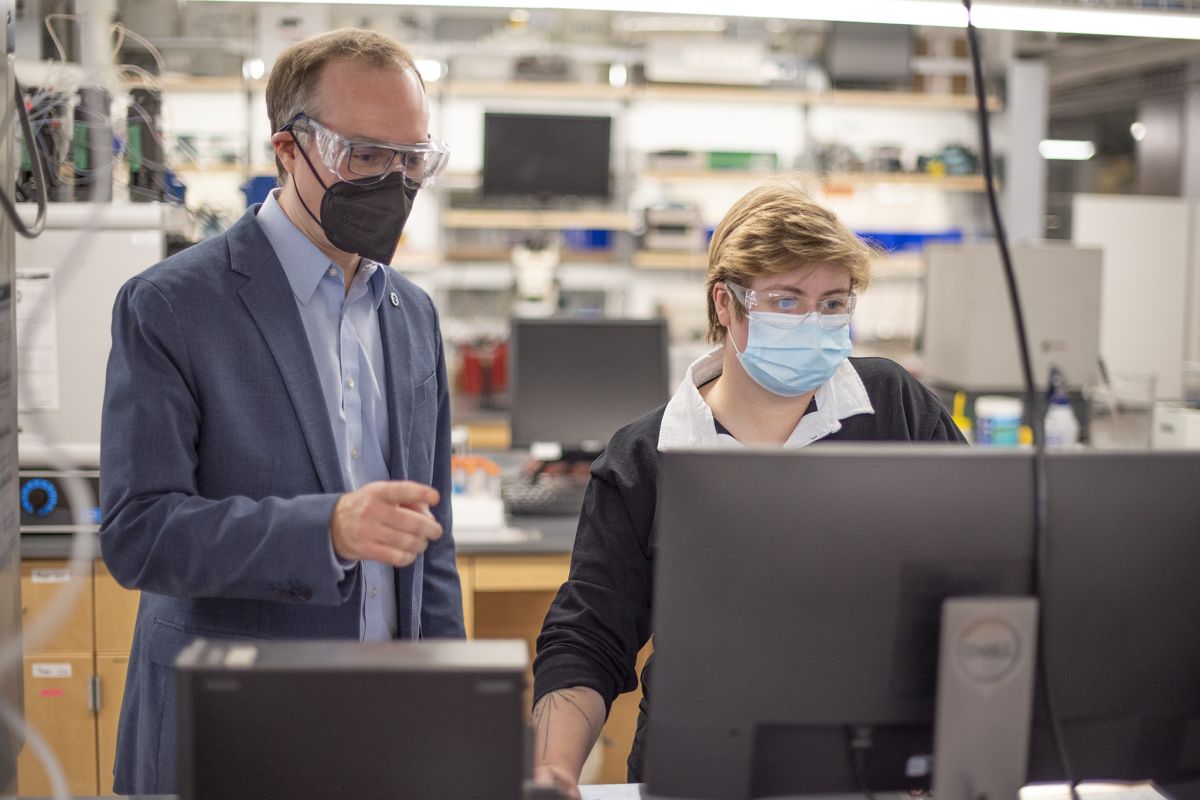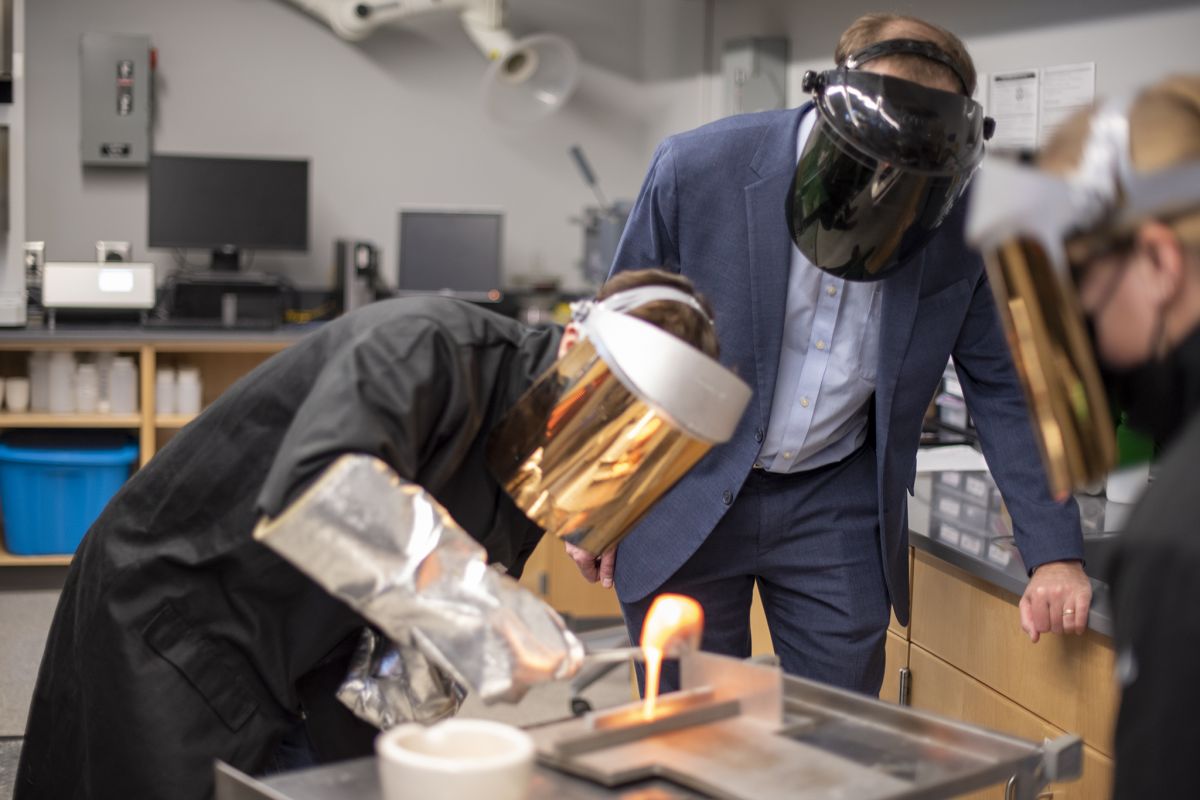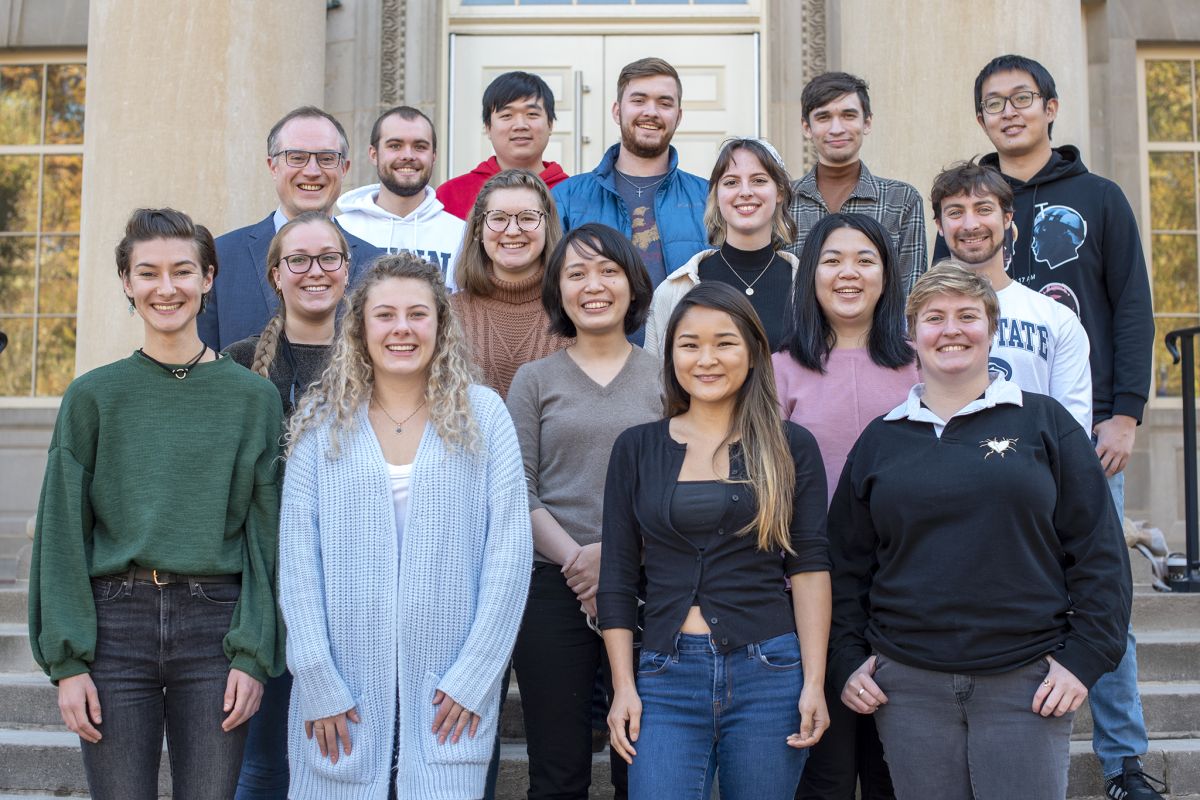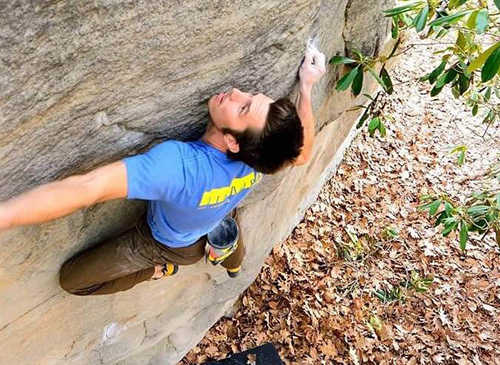By Cara Aungst

Dr. Mauro and Brittney Hauke (Ph.D. student) performing a calorimetry experiment on a glass sample. Photo: Provided.
If glass and ceramics had a hall of fame, there’s a good chance that there would be a lifesize (glass, of course) statue of John Mauro at the entrance. The co-inventor of Gorilla Glass has already been named to the National Academy of Engineering and the National Academy of Inventors, and has just been named as the editor in chief of the Journal of the American Ceramic Society. After a prolific 18-year stint at Corning Incorporated, Mauro decided to bring his expertise to Penn State six years ago. He said the university was a clear choice — no pun intended.
“I chose Penn State because it is a powerhouse of research,” he said in his keynote speech at Penn State’s Materials Day, held Oct. 20. “Penn State is also known as being the No. 1 best university for industrial collaborations. Since I wanted to conduct industrially relevant research, this was another factor that led me to Penn State. Plus, the culture here is very supportive. It combines top-notch research without the attitude that is sometimes associated with that.”
“We see future LionGlass collaborations as an opportunity where everyone wins: the glass companies, the consumers and, ultimately, our whole planet by driving the glass industry toward sustainable manufacturing.”
After Materials Day, HappyValley Industry reached out to Dr. Mauro to find out the rest of the story. Why glass, and why is it so important to industry? And what research and discoveries has he been involved with over the past six years? Here’s what he said.
What inspired you to follow this line of research?
I came to Penn State in 2017 after an 18-year career at Corning Incorporated, where I had the pleasure of working on a wide variety of cutting-edge glass research for display technologies, personal electronic devices, optical communication and more. When I arrived at Penn State, I wanted to share my passion for glass with the next generation of materials scientists and engineers.
I came here hoping to inspire the students, but the students here inspire me back. I’ve found that the students at Penn State are so eager to learn about materials science and apply their knowledge to make the world a better place.

Glass melting experiment in Dr. Mauro’s lab. Photo: Provided.
Can you tell us a little bit about your glass research and why it’s so important for American industry?
My research group covers all aspects of glass science, including both experiments and modeling. On the experimental side, we have three, high-temperature melting furnaces to synthesize glasses at temperatures up to about 1700 degrees Celsius. On the modeling side, we cover everything from theoretical derivations through large-scale computer simulations.
Our research is important for the American glass industry because there is a high demand for students to be trained in glass science, but there aren’t enough academic research groups in glass to meet this demand. The insights that we gain through our research can be directly applied toward the development of next-generation glass and glass-ceramic materials.
How has your research already made global impact and what are you working on now?
My research at Corning has already made a global impact, especially with the development of Corning Gorilla Glass products, which are used in several billion devices worldwide. You are probably carrying a piece of Gorilla Glass in your pocket right now.
My research has also led to significant advances in the understanding of glass physics, including the description of glass viscosity and the relationship between glass chemistry and physical properties.
“I chose Penn State because it is a powerhouse of research and it’s known as being the No. 1 best university for industrial collaborations.”
Now you are working on something called LionGlass here at Penn State. What makes it such a disruptive technology? What are industries that could benefit?
LionGlass is a new family of glass chemistry that is meant to replace soda lime silicate glass — the common glass used on everyday items including windows, jars and drinking glasses.
Soda lime silicate accounts for the vast majority of global glass production and is therefore responsible for the greatest carbon footprint of the glass industry as a whole. There are two contributions to its carbon footprint: the high temperatures required for melting the glass and the release of carbon dioxide as carbonate batch materials (limestone and soda ash) decompose into oxides.
LionGlass addresses both of these sources of carbon dioxide emission by eliminating the use of carbonate batch materials and by significantly lowering the melting temperature. The dramatically lower temperatures will also help extend the lifetime of glass melting tanks.

Photo of Dr. Mauro’s Glass Research group at Penn State. Photo: Provided.
At Materials Day, you talked a bit about industry partnerships to move LionGlass to the next level. What would that collaboration look like?
We need to partner with a glass company to help with scaleup, manufacturing and commercialization. We don’t want LionGlass to be seen as a threat to the existing glass industry.
“I’ve found that the students at Penn State are so eager to learn about materials science and apply their knowledge to make the world a better place.”
We see future LionGlass collaborations as an opportunity where everyone wins: the glass companies, the consumers and, ultimately, our whole planet by driving the glass industry toward sustainable manufacturing.
Is there anything else that you would like to add?
My family and I feel incredibly grateful to be a part of this wonderful Happy Valley community.






